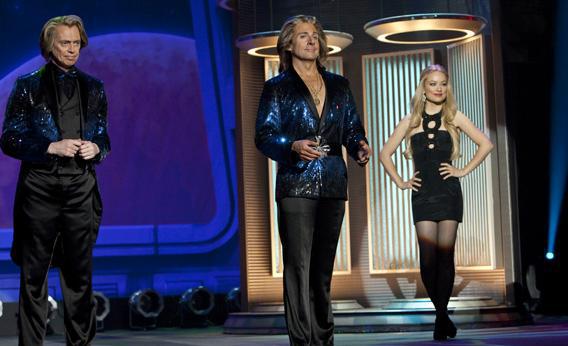The Incredible Burt Wonderstone, directed by TV-sitcom veteran Don Scardino, is a maddeningly under-ambitious film comedy. Blessed with a cast of some the best comic actors now working in movies (Steve Carell, Jim Carrey, Steve Buscemi, Alan Arkin), the movie aims for little more than to accompany its hero, the washed-up magician of the title, played by Carell, through the standard stations of the buddy-comedy via crucis. There’s the childhood friendship, the adult betrayal, the regret montage, the reconciliation. Burt Wonderstone actually hits some of these marks with a fair amount of style, but the plot points themselves are so predictable, and the stretches in between so sparsely populated with jokes, that it would be impossible to call this a successful comedy. All the same, Burt Wonderstone did make me laugh—sporadically, yes, but sometimes loudly, and straight up till the end. The closing credits unroll over an extended sight gag so deliriously sick it had me wishing more of the preceding film had dared to push its jokes that far.
The best thing in Burt Wonderstone, besides that final gag, is the second-sickest: Jim Carrey’s performance as a David Blaine-esque street magician named Steve Gray, who specializes in provocative stunts like spending the night on a bed of hot coals, retaining his urine for 12 days straight, and hammering nails into boards with his head—all for the sake of his hit show on Intense TV, Brain Rapist. As the dip-dye-tressed, mystical-profundity-spouting Steve, Carrey is almost frighteningly committed and precise. The character, essentially a professional masochist, is just the kind of disturbed true believer he was born to play. We never learn enough about the world of Steve Gray: I wanted to visit his apartment, go behind the scenes on the Brain Rapist set, maybe even learn something about his no-doubt-terrifying sex life. But Carrey brings such an excess of firepower to his underwritten role that I found myself looking forward to Steve’s every appearance (even though, or possibly because, some sort of hard-to-watch body-mortification gag was usually soon to follow).
It’s too bad that, rather than sketching out the details of the Vegas pro-magician circuit the film’s characters inhabit, the screenplay (by Jonathan Goldstein and John Francis Daley) focuses almost exclusively on its one-note title character. Burt Wonderstone—born Albert Wunderstein, a nerdy shrimp of a kid whom we see being tormented by bullies in an opening flashback—began doing magic to escape from the small humiliations of everyday life. That, and because his modest kit of tricks evoked such awe in his devoted best friend Anton, played as an adult by Steve Buscemi.
But by the time Burt has reached middle age, co-headlining a successful long-running magic show at Bally’s with that same best friend, he’s lost not only his youthful joy in magic but all pretense of being a tolerable human being. He insults his partner, seduces and then alienates an endless succession of sexy assistants (all of whom he calls “Nicole”), and lazily declines to make any changes in his and Anton’s now-dated act, even when his boss, casino mogul Doug Munny (James Gandolfini) points out that they’re losing audience share to younger, hipper acts like Steve Gray.
The process by which Burt loses everything that’s dear to him, then wins it all back again (with the help of his childhood hero, a reclusive elderly magician dryly underplayed by Alan Arkin) is so familiar you can envision the story meeting where it was first whiteboarded out. There’s an out-of-left-field third-act obstacle, an unlikely workplace romance (between Burt and his latest mistreated assistant, played by a likeable but underchallenged Olivia Wilde), and finally a climactic magic competition in which Burt and Anton must face off with the increasingly deranged Steve. It’s a long, limping slog from the halfway point to the finish line, even if the actors have built up enough goodwill by then that it’s bearable to coast the movie out.
But there’s a better movie buried in The Incredible Burt Wonderstone, a twisted tribute to the world of stage illusion that peeks out in the occasional funnier-than-expected detail (that elaborate closing sight gag, for example, or the name of a struggling magician character played by Jay Mohr: “Rick the Implausible.”) Steve Buscemi—an actor who doesn’t often get a chance to swivel his hips in a spangled red-velvet jumpsuit—brings a touching sweetness to the role of the guileless, blond-forelocked Anton, who aspires to bring magic to the lives of Third World children until he figures out they’re more interested in food and clean water. And though Carell’s character’s abrupt shift from insufferable pighead to emotionally intuitive mensch is somewhat mystifying (did I nap through a trip to rehab?), he’s one of the few actors who could make the vapid, spray-tanned Burt someone we want to see redeemed. But it’s Jim Carrey’s transformation into a wild-eyed reality-show shaman that provides The Incredible Burt Wonderstone with its only true “how’d he do that?” trick.
